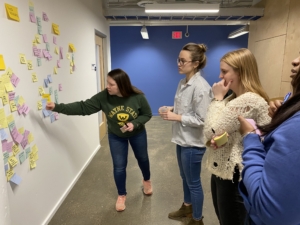Renee Pellegrini, a 2019-2020 Fellow, hails from Roscommon, Michigan. Renee has a Bachelors in Public Affairs and a Masters in Public Administration from Wayne State University.
Tell us about your host company and your role in the organization.
My host company is Goodwill Industries of Greater Detroit (GIGD), a nonprofit providing employment and training services via three MichiganWorks! Sites, Flip the Script, a reentry program, and A Place of My Own Clubhouse. Additionally, GIGD has two subsidiary companies, Green Works and Goodwill Automotive. Green Works breaks down components of items such as wiring, removing the lead, shreds refrigerators from DTE’s buy-back program, or draining oil from transformers – materials that other companies repurpose or recycle. Goodwill Automotive, is a Tier 1 automotive supplier to companies such as the Big 3. These companies also host trainees of the Skill Building, Flip the Script and Work Readiness programs, and the veteran’s program Operation: Good Jobs.
I assist the company in the Human Resources department working on special projects for the department, most of which affect the whole company. I assisted the team in the arduous process of implementing the HR department’s section of a new workforce development platform. This included creating a pamphlet showcasing tools employees can use and how they have a new autonomy over changing their personal information, tax deductions and direct deposit information, and I recorded videos that were embedded in a PowerPoint slide deck employees can reference for making such updates. Additionally, I used the Design Thinking methodology, interviewing management and utilizing feedback to redesign their New Hire Employee Orientation.

Ideation for an earlier project before going virtual.
Tell us about the challenge project you’re currently working on; what are you learning from the experience?
In light of the pandemic, Challenge Detroit pivoted to assembling and working on challenge projects virtually. Our challenge #4 partner was originally Michigan Community Resources; however, the immediate need to serve additional organizations within the community meant a redesign of the project scope. The team I was a part of worked directly with MCR, evaluating how to best assess the technological needs of the organizations they serve. Our team was able to interview several amazing organizations such as Journi and Grace in Action, who offered valuable information around their use of technology, how the shift to virtual life has impacted their needs, and how they were previously serving the community. These interviews helped shape the deliverables we created for MCR, such as a redesigned technology needs assessment, and a Technology Training Manual that can be used in multiple settings and formats. This project, as all of the others, immersed me in a part of the community I had not been a part of, and enlightened me on topics that gave me pause, such as the distrust of technology held by some residents.
Please share the most memorable moment you have experienced so far as a Fellow. Why was it memorable and how has it impacted you?

L to R: Dillion, Alyssa, Me, Stakeholder Teddy Dorsette III and Samantha. Project with CRIO.
Memorable to me is the opportunity to work with the City of Detroit’s Office of Civil Rights, Inclusion and Opportunity (CRIO) Department. The project our team worked on involved the disability community. What I have taken away from that project was how important listening is to bridging the relationship between government and the community it serves.
How do you hope to impact the community this year?
From this fellowship year I wish to take with me a greater understanding of the differing pockets of people and activities within the City; it’s such a diverse place that isn’t always showcased in the most positive light. I also will take with me skills I’ve gained both through the projects at my host company, to the breadth of knowledge my coworkers have taken the time to teach and share with me, as well as the skills I’ve been able to sharpen via the variety of project deliverables I’ve worked on. I have especially gained a wealth of knowledge and skills from my fellow Fellows during this time. It’s been a great pleasure to not only personally grow, but to see growth in all the other fellows.
Since becoming a Fellow, what have you learned?
At other jobs I’ve experienced a breakdown of communication between management and employees, as well as changes in policy and procedures without communication and further directives. At my host company, working on the implementation of a new workforce development program that impacts all employees, I found the incredible importance of cross-department structured meetings and communication. Working with various fellows on the different challenge projects, communication between team members, across teams, and the very importance of communication with our partner liaison for each project. This dynamic has been heavily impacted without face to face meetings, and one thing agreed on is the need to almost over communicate to ensure details are not missed and everyone is included in the collaboration process.
If someone reading your interview is considering applying to be a Fellow, how would you encourage them to apply?
I encourage anyone wishing to push their boundaries, work with other forward-thinking, creative people and wanting to give intellectually to the community to apply.

